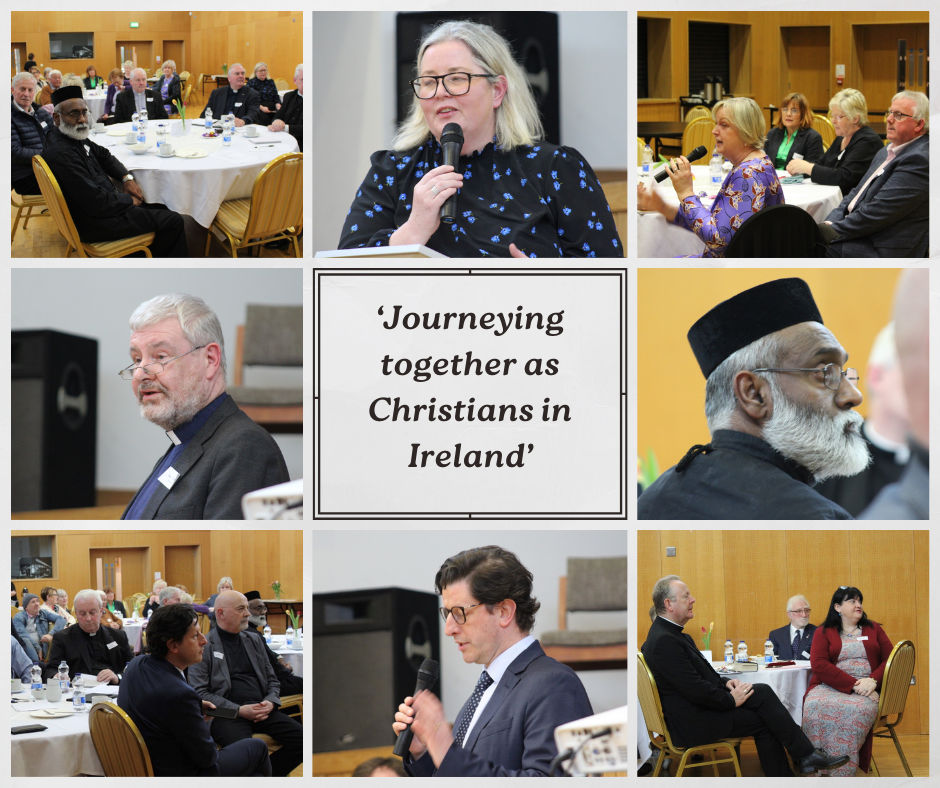
Photos taken at the ‘Journeying together as Christians in Ireland’ event at the Drumcree Pastoral Centre, Portadown (Catholic Communications Office archive)
- Irish synodal initiative draws inspiration from inter-Church relations
On 25 April, the Archdiocese of Armagh and the Diocese of Dromore jointly hosted an inter-church dialogue event in the Drumcree Pastoral Centre, Portadown, on the theme: ‘Journeying together as Christians in Ireland’.
The event aimed to explore how the synodal processes currently underway in the Catholic Church, in Ireland and globally, can draw inspiration from the work of inter-church relations in Ireland, while also contributing to the strengthening of that work at both local and national level.
In a message of support and encouragement to the gathering Cardinal Mario Grech, Secretary General of the Synod of Bishops in Rome, said, “In the preparatory document for this synod of the global Catholic Church, with its theme ‘Communion, Participation, Mission’ we underlined that we cannot walk alone. We need to walk with everybody, especially our brothers and sisters in Christ with whom we share baptism, the cornerstone of our vocation and mission. In a world divided where, apparently, people are finding it difficult to come together we Christians, together, have something to offer in service to humanity.”
Opening the event Archbishop Eamon Martin expressed appreciation for the way in which the deepening friendship and fellowship between Christian churches on the island have strengthened their collective witness to the Good News of the Gospel, saying, “I am convinced that we in the Christian Churches here in Ireland have so much to learn from each other about the key themes that mark the Synod currently underway within the Catholic Church. These themes are communion participation and mission. As we prepare for the second international gathering this October in Rome, the focus of discussions is turning to the question: how can we be a Synodal church in mission? Such a question has a particular resonance for us here in these islands, particularly given the backdrop of conflict which continues to impact our relationships.”
As a source of inspiration and learning, the event included reflection on the Considering Grace project that gathered stories of people’s experiences of how the Presbyterian Church in Ireland had responded to the Troubles. Rev Tony Davidson said: “In compiling Considering Grace the Presbyterian Church in Ireland listened carefully to academics and critical friends about how we responded to the Troubles, so that together we could hear the Word of God. I trust other churches also hear the Word of God as they take the risk of listening to outside voices. I am grateful for the grace and generosity in this invitation from the Catholic Church to share our experiences as part of this dialogue.”
Bishop Michael Router and Ms Janet Forbes situated this inter-Church dialogue event in the context of the wider synodal process, in Ireland and internationally. They highlighted the benefits of sharing stories as a way of building community and restoring trust, paving the way for collaborative engagement with issues of shared concern to all Christians.
Dr Damian Jackson, General Secretary of the Irish Council of Churches and Irish Inter-Church Meeting, reflected on the significance of this gathering from the perspective of Ireland’s national inter-Church structures. Dr Jackson said, “The title and emphasis for this event – Journeying together as Christians in Ireland – reflects the way in which our sense of identity and belonging as Christians on this island increasingly transcends denominational boundaries, as our sense of being part of a wider and more diverse community of followers of Christ is strengthened through encounter and dialogue. In this trend we see the work of those committed to inter-Church relations, at both national and international level, during recent decades, bearing fruit. This unifying vision of Christians in Ireland has at its heart an appreciation for the significance of baptism which unites us in Christ and connects us to one another. In our national inter-Church structures we seek to model unity in diversity by investing in the kind of respectful dialogue from which will flow the relationships of trust that support and encourage the vital work that is done at the level of local communities by Christians working together to bring hope and healing to those who need it most.”
Participants at the gathering, representing a wide range of local inter-Church groups and projects, explored together two questions:
- How is our journeying together as Christians contributing to the work of healing and reconciliation in our community?
- How might the synodal process support us to go deeper in working together as Christians for the healing and wellbeing of our communities?
The discussion that followed conveyed a deep appreciation for the hopeful nature of the synodal process and the way in which it was both recognising the good work that has been done to date in the area of inter-Church relations, and also creating new opportunities for those who have not yet been reached in that work. Participants reflected on how much Christians have in common across the different traditions, facing similar challenges in a context of increasing secularisation, a deeply polarised society, stark divides of socio-economic inequality and decreasing youth participation in church life. There was a consensus that the synodal process offers an effective methodology of encounter, with deep listening leading to mutual understanding and providing a foundation for collaborative action. It requires a significant investment of time and effort, but it was considered that this event demonstrated the benefits of that investment in the fellowship, solidarity and prayerful engagement with the issues impacting our communities that will strengthen our collective witness to our Christian faith in the public square.
The learning from this event will be shared widely as a resource for local inter-Church groups, for the national inter-Church structures, as well as for Churches Together in Britain and Ireland, the Irish Synodal Pathway and the universal Synodal process in the Church.
ENDS

